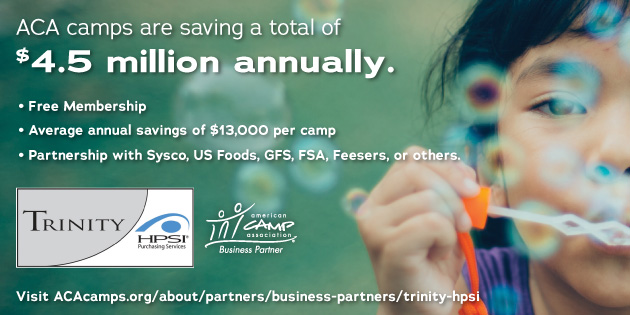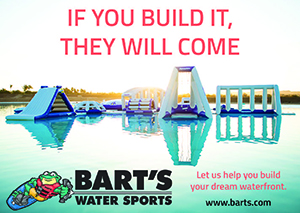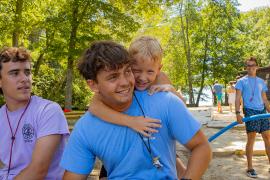One of the common threads of this past year was the sheer amount of alone time most of us experienced. Even if you live in a full house like I do, the pace and variety of social experiences dropped off a cliff. Whether you spent time learning to bake, getting proficient at Zoom, or just managing to keep it together, chances are you did this by yourself. And we all noticed what that lack of time with friends and family felt like. One of the fundamental ways we make and keep friends is by spending time with them. And the more time we spend with someone, the better we know them. In many ways, this year taught us that ". . . if you can't be with the one you love, honey, love the one you're with" (Stills, 1970). Which was mostly ourselves.
So what did you learn? How did you take care of yourself? By virtue of spending more time alone, you likely learned more about what you like, don't like, need, and want.
Now you are going to camp — probably the most communal experience you could have. Your old friends will be there, new friends will be there — and, of course, the campers will be there too. But let's center on you for a minute. Whether your camp leaders have told you this or not, you are the reason that kids have a great, or not-so-great, camp experience. So it stands to reason that if you take care of yourself, you'll be better able to take care of your campers.
Truly, the happier, healthier, and more stress-free you are, the better able you are to provide kids with a great camp experience.
Self-care is the name of the game. But self-care as it exists in the rest of the world doesn't exactly fit easily within camp life. Ask your average adult what they do to take care of themselves, and you'll end up with a wide range of activities and ideas, very few of which are tethered to a specific time, with limited resources, and under the guise of someone else's priorities, which pretty much describe all the responsibilities at camp.
Self-care is mostly about getting what you want and need to feel balanced — answering the questions "What do I need" or "What can I do"? That's a good place to start, but sometimes the "me" part of self-care will be impractical for camp. Self-care at camp demands more considerations. With campers as our priority, at least three distinct layers of self-care come into play:
- Me
- Me and you
- All of us
Me
This is the area that, consciously or not, you have been working on since March of 2020. Through the uncertainty and anxiety of the pandemic, routines and experiences emerged that helped you calm down, stay in control, and feel safe. What were they? Perhaps they don't seem camp appropriate, but at least take stock of what you've been doing for yourself. Let me give you an example of my own: I'm really into music, and over the last year, I've reorganized my vinyl collection twice and reread the liner notes on hundreds of records. Not exactly an easy-to-replicate exercise for the seven and a half minutes of downtime you might need to fill before evening activities at camp, of course. But if you look at it from a different angle, you can see that I was actually doing something in a slow and methodical way — learning or relearning about things that interest me — all based on my love of music.
Here are some actions that may help keep some of the focus on self-care activities as you transition into life at camp:
- Slow down.
- Have fun.
- Be curious.
Slow Down
Prior to 2020 we were moving really fast. Then we screeched to a halt. Now we need to restart slowly. Part of the beauty of slowing down is your ability to take in and appreciate more of what is happening. You get to go to camp! You get to hang out and play! Savor it.
One way to slow down — whether you're focused on the harried pace of activities, the minute-by-minute interactions, or that ever-growing to-do list — is to ask one more question. This might sound like a suggestion to delay the inevitable or procrastinate, and while every tool is only as good as how you use it, slowing down is really about savoring the interaction. One more question will lead to more information, which often results in more insight and clarity. If for no other reason, your campers and fellow staff will feel that you are genuinely interested in them.
Another way to help your brain and body slow down is through conscious noticing, which is just another way of being mindful. Most of your job and responsibilities come down to some kind of noticing, but you can exercise this skill in a new way. Every once in a while, physically stop what you are doing and make the effort to consciously notice something new. Small or large, petty or profound, it doesn't really matter — the act itself helps you to be a bit more thoughtful.
Have Fun
Few things are better for your health and well-being than having fun. And your fun is an essential ingredient in creating your campers' fun. So, how do you have fun at camp and stay interested? You have to put in some effort. Of course, a lot of what we do at camp is meant to be fun, but because we are in charge of the merriment, it isn't always, well, fun.
What fills you up? What do you love to do? It's not always easy to answer these kinds of questions. You also have to consider where you are, who you are with, and what's OK and not OK at camp. The key is to ask yourself how you can do more of this at camp. I won't be bringing my vinyl collection to camp, of course, but I enjoy organizing — and recognizing that could lead me to some practical yet fun organizational tasks at camp.
Be Curious
Curiosity is such an interesting notion. It seems to break down into equal parts wonder, awe, and fascination mixed in with a sense of strange uniqueness and the uncomfortable feeling of not knowing. And there may not be a better description of how camp counselors should feel about their campers. If you are curious about your campers, you'll be fascinated by who they are and awed by their ideas. The contours of their differences will stand out to you in new and exciting ways. In other words, you'll want to hang out with them and get to know them even better.
To inspire curiosity about your campers, first ask yourself how you and a particular camper are similar. What are the ideas, behaviors, and interests you have in common? The only real way to answer that question is to interact, listen, and pay attention. Because you are going to slow down and ask at least one more question, you are already on your way to finding out more than you would otherwise know.
Second, also pay attention to how you are different. My sons are very into a specific video game called Zelda: Breath of the Wild. My daughter couldn't care less about the video game but is really into art, specifically anime. By paying attention and being curious about their interests and developing passions, it was easy for me to find the common ground. Now we all sit around, some to play, others to draw — and only one of us wishes he were spinning a record instead. But we are together, and that is what's important.
Third, based on what you've already discovered about someone, ask yourself, "What's the next thing I want to know?" It's a great technique when you find yourself less than interested in a particular camper or subject. I know I'm not supposed to say that, but it's honest. Kids aren't necessarily naturally fascinating. However, if you set yourself up with something new you want to learn about a camper, you'll not only have the next conversation starter, but you'll be building a better understanding of that particular kid.
Me and You
The next layer of self-care, me and you, is a recognition that you are a part of a group. Think about the things you need or want in comparison to the desires of everyone else in the group. You want it to be quieter; they may want it to be louder. You want to listen to music; they would rather talk. You want to exercise; they want to sleep as hard as they can for the 45 minutes left in rest hour. They aren't always opposite, sometimes just different — and it isn't a competition. This kind of self-care is often framed as teamwork or compromise, and yes, there are elements of those. But the point is to make your needs real and stated; if you don't say what you want, no one will know. By expressing your desires, others will speak up about theirs. Then, at the very least, your group has spent some time talking about what you do to take care of yourselves. There is value in just that. The challenge is not only to try to make room for what everyone needs, but then to use that information to support a better functioning camp. Here are two examples of what I mean.
What are you good at? That may not be an obvious choice for self-care, but it is certainly easier and more stress-free to do stuff you're good at. Are you a good listener? At camp you can make every camper feel like the most important person in the room. Are you silly and playful? At camp you can become like the Pied Piper, leading campers on an adventure through the land of make believe.
Once you have identified your personal talent, the important question becomes, "How can I do more of it at camp?" Try to join forces with others in your group who may not share your particular talent but offer talents of their own. I guarantee that they are better than you at something, and that will be really helpful. Of course, this means that you must talk honestly about yourselves, be willing to ask for help, and trust that it will come together.
Another example of me-and-you self-care is to identify what you need or want and then ask for more of it by way of offering something. Do you really like to exercise? Host a morning jogging club with campers who like to run. Do you love music? Ask your camp to invest in some used instruments and offer a rock band program, or use some free time to offer a music critics session, listening to and then discussing music.
I know what you're thinking. All of this sounds good for the extroverts at camp, but what about everyone else who needs peace and quiet? Many of us have come to depend on alone time over the past year. Indeed, the general busyness of camp and the constant and consistent togetherness might make the need for quieter, slower, and less-crowded time more pronounced. But the same principle applies. Host a rest hour book club. Help the counselors-in-training develop and facilitate a solo experience. Take kids on a silent nature hike with the intention of seeing some animals in the wild.
These and other ideas may not always work or fit nicely into your camp's schedule, but just thinking creatively about your wants and needs will put you in the position of seeing more ways to fulfill them. You are also subtly encouraging others to put their needs out there — thus reinforcing the self-care culture at camp.
All of Us
Finally, there is us, which is self-care that recognizes that what "I" want and what the group wants sometimes has to be the same. As a camp counselor, this is your world a lot of the time. Because of the way schedules, supervision, and activities work, you are often in a situation where nobody gets exactly what they want in order for everyone to get some of what they want. While every group is different, one way you can make everything you do with campers more fun and less stressful is to give them a map. Maps help you structure and organize how you are getting somewhere but also allow for flexibility if you need to find a new route. So, map it! Activities, transitions, free time, meals — all are intended to be fun and engaging. One reason they sometimes aren't has nothing to do with the content and everything to do with the setup and structure. Accomplishing anything is difficult if you don't have a clear idea of what to expect. While activities will often deviate from the map, or plan, a well-thought-out process is a good starting point. One simple strategy is the teaching mantra, "plan, do, review."
- Plan: What are we going to do? What should we expect? Sometimes you'll have answers and other times it's just a guess, but either way, the entire group will develop an idea of what's about to happen.
- Do: Execute the activity. Because it won't go exactly as planned, this is where you have to be flexible. Again, the entire group has created an expectation for what is going to happen. The do phase is about adjusting those expectations along the way.
- Review: Talk about what you all just did. What were the high points? What could we have done differently?
This mapping exercise may seem more like a leadership strategy than a self-care idea. However, when we can make group experiences less stressful and more engaging and enriching, it will be easier to identify, advocate for, and accommodate individual needs — including your own.
This summer is going to be amazing. Just remember, day in and day out, through the challenges and the successes, the one constant is that you have you. When you learn how to take good care of yourself, you'll be exponentially better at taking care of others. Just remember to love the one you're with.
Scott Arizala is a leading expert, trainer, and consultant in summer camp. He is the CEO of The Camp Counselor, a consulting and training company, and the executive director of Chasing Summer, an organization dedicated to creating access for people with autism in recreation and education. He is a pioneering contributor to and project manager of Expert Online Training, a world leader in online training for camp staff. Scott is the author of the best-selling book, S'more Than Camp and contributing editor of Happiness, Diversity & Autism: Practical Strategies for Inclusion.
Reference
- Stills, S. (1970). Love the one you're with. Stephen Stills album. Atlantic Records.




